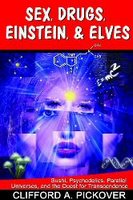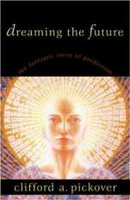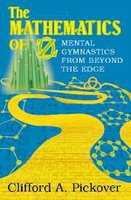Saturday, December 17, 2005
God and intelligent design
If God is everywhere, then why is God so hard to perceive? One could imagine a God who would be more like a Chairman Mao or a Comrade Stalin. This God would have designed a universe with photographs of himself hung everywhere in nature. We would be compelled to believe in the existence of this God, because everywhere we turned with our microscopes, telescopes, and other devices, there would be both the evidence for his existence and of course also the secret police to enforce our acknowledgment.
Of course, science is yet to find an unequivocal "made by God" label attached to nature.
Read more:
http://www.metanexus.net/metanexus_online/show_article.asp?9284
Of course, science is yet to find an unequivocal "made by God" label attached to nature.
Read more:
http://www.metanexus.net/metanexus_online/show_article.asp?9284
Comments:
<< Home
If the signs of God were everywhere, and it was unmistakable that God existis, there would still be people who didn't believe God existed.
Maybe the signs are everywhere and it's just a choice of whether you believe or not.
Think of it as human love.
You can tell someone you love them, but they have the choice whether or not to believe you. You can give them gifts do everything they want and give them all the signs that you love them, and still they may not believe you. Or... maybe they don't want to be loved, by you or anyone. They still have the choice whether or not to accept love from you.
Would you really want a God to exist that forces you to love it? Wouldn't people rebel from being forced to love a God? In human terms, don't you rebel against someone who says, here are the signs that I love you, now love me back.
Isn't it possible that God is out there, and has given us the signs, the question is... are you seeking Him out or just seeking for an excuse not to love.
Maybe the signs are everywhere and it's just a choice of whether you believe or not.
Think of it as human love.
You can tell someone you love them, but they have the choice whether or not to believe you. You can give them gifts do everything they want and give them all the signs that you love them, and still they may not believe you. Or... maybe they don't want to be loved, by you or anyone. They still have the choice whether or not to accept love from you.
Would you really want a God to exist that forces you to love it? Wouldn't people rebel from being forced to love a God? In human terms, don't you rebel against someone who says, here are the signs that I love you, now love me back.
Isn't it possible that God is out there, and has given us the signs, the question is... are you seeking Him out or just seeking for an excuse not to love.
I have many friends who are religious - at least in terms of going to church or temple. They all say "of course I don't believe that God is an old man with a white beard sitting on a throne in heaven". What's peculiar to me is that they - the Christians among my friends at least - say the same thing almost word-for-word, as if they are expressing dogma rather then belief.
Then they proceed to describe their understanding of God, which turns out to be very much like an old man with a white beard sitting on a throne in heaven: "Wise", "ancient", "rules over all", etc.
For myself, I DO believe there is what I call "an urge toward the trancendant,"(I experience it myself) but I do NOT believe that that is evidence of a Trancendant Being. I accept that there might be a "trancendent" nature of the Universe - unless it's really just a neurological artifact. "God" is a nice shortcut to describe the "unity" of the universe (whether or not that unity is real), but once you start assigning human emotion like Love, or making statements about what God "wants" (another human emotion), then you are in trouble.
Another problem I have with the idea of God, is with its constantly shifting definition. Back in the year 1000, people believed that God moved the planets and stars, that He caused all the events around them, was the explanation for every unknown thing. As our understanding has increased, the definition of God has become more and more abstract, just keeping a short distance ahead of our understanding. So now God is "Love" when yesterday God was the Sun and the Moon. Pretty fickle, I think.
I had a very powerful religious experience once: I can say with absolute 100% certainty that I "saw God". It was overwhelming and so moving I had tears of joy running down my face. Yet, years later, I trace my equally certain atheism to that moment - it was as if God Himself was telling me there was NO God. And who am I to argue with God?
Then they proceed to describe their understanding of God, which turns out to be very much like an old man with a white beard sitting on a throne in heaven: "Wise", "ancient", "rules over all", etc.
For myself, I DO believe there is what I call "an urge toward the trancendant,"(I experience it myself) but I do NOT believe that that is evidence of a Trancendant Being. I accept that there might be a "trancendent" nature of the Universe - unless it's really just a neurological artifact. "God" is a nice shortcut to describe the "unity" of the universe (whether or not that unity is real), but once you start assigning human emotion like Love, or making statements about what God "wants" (another human emotion), then you are in trouble.
Another problem I have with the idea of God, is with its constantly shifting definition. Back in the year 1000, people believed that God moved the planets and stars, that He caused all the events around them, was the explanation for every unknown thing. As our understanding has increased, the definition of God has become more and more abstract, just keeping a short distance ahead of our understanding. So now God is "Love" when yesterday God was the Sun and the Moon. Pretty fickle, I think.
I had a very powerful religious experience once: I can say with absolute 100% certainty that I "saw God". It was overwhelming and so moving I had tears of joy running down my face. Yet, years later, I trace my equally certain atheism to that moment - it was as if God Himself was telling me there was NO God. And who am I to argue with God?
You don't consider the complexity of Dna or that of a snowflake as evidence? If not, then what would you consider as evidence of a creator?
Wally said (above), "You don't consider the complexity of Dna or that of a snowflake as evidence?"
To which I must point out: Complexity does not require design.
It's only because our brains seek meaning and structure in chaos that we attribute such complexity to God.
To which I must point out: Complexity does not require design.
It's only because our brains seek meaning and structure in chaos that we attribute such complexity to God.
This is a great definition of the God championed in PanDeism extrapolated from Warren B. Sharpe's "Philosophy for the Serious Heretic: The Limitations of Belief and the Derivation of Natural Moral Principles" (2002):
God didn't create the universe, but God became the universe. Then he forgot that he became the universe. Why would God do this? Basically, for entertainment. You create a universe, and that in itself is very exciting. But then what? Should you sit back and watch this universe of yours having all the fun? No, you should have all the fun yourself. To accomplish this, God transformed into the whole universe. God is the Universe, and everything in it. But the universe doesn't know that because that would ruin the suspense. The universe is God's great drama, and God is the stage, the actors, and the audience all at once. The title of this epic drama is "The Great Unknown Outcome." Throw in potent elements like passion, love, hate, good, evil, free will; and who knows what will happen? No one knows, and that is what keeps the universe interesting. But everyone will have a good time. And there is never really any danger, because everyone is really God, and God is really just playing around.
God didn't create the universe, but God became the universe. Then he forgot that he became the universe. Why would God do this? Basically, for entertainment. You create a universe, and that in itself is very exciting. But then what? Should you sit back and watch this universe of yours having all the fun? No, you should have all the fun yourself. To accomplish this, God transformed into the whole universe. God is the Universe, and everything in it. But the universe doesn't know that because that would ruin the suspense. The universe is God's great drama, and God is the stage, the actors, and the audience all at once. The title of this epic drama is "The Great Unknown Outcome." Throw in potent elements like passion, love, hate, good, evil, free will; and who knows what will happen? No one knows, and that is what keeps the universe interesting. But everyone will have a good time. And there is never really any danger, because everyone is really God, and God is really just playing around.
God is in all things, this is the truth of Pandeism.
Pandeism teaches that God became the universe, because God alone can not learn what it is to face limitations.
Pandeism teaches that God does not interfere in the affairs of the universe, for doing so would ruin God's experience of learning from the natural course of the universe.
Pandeism teaches that all things are part of God.
Pandeism teaches that understanding of God can only be reached through logical and rational examination of the evidence uncovered via the scientific examination of processes of the universe.
Pandeism teaches that the universe must someday, somehow, return to being God.
I will see you all on that day.
Post a Comment
Pandeism teaches that God became the universe, because God alone can not learn what it is to face limitations.
Pandeism teaches that God does not interfere in the affairs of the universe, for doing so would ruin God's experience of learning from the natural course of the universe.
Pandeism teaches that all things are part of God.
Pandeism teaches that understanding of God can only be reached through logical and rational examination of the evidence uncovered via the scientific examination of processes of the universe.
Pandeism teaches that the universe must someday, somehow, return to being God.
I will see you all on that day.
<< Home
 Godlorica
Godlorica



























